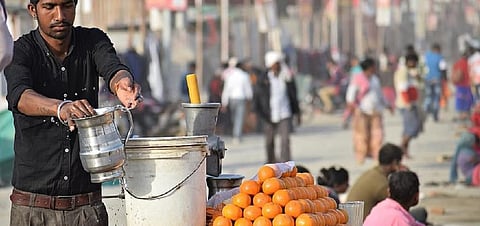

The presence of antibiotic-resistant bacteria in street fruit juices being sold in Delhi has been reported by a study published in the 13th issue of the International Journal of Environmental Research and Public Health last month.
The study was conducted jointly by researchers from Amity University in India, along with Indiana University and Sam Houston State University in the United States.
The study has reported for the first time, the microbial profile and antibiotic resistance in fruit juice samples from urban Delhi.
In this exploratory study, juice samples and water used for juice preparation for the purpose of testing were taken from five crowded markets of Delhi including Kamla Nagar, University of Delhi (north campus), Tilak Nagar, Chandni Chowk and Rohini.
These were enumerated for the total bacterial count, Escherichia coli, Salmonella and Vibrio. A questionnaire survey of the fruit juice vendors was also conducted.
The results of the study showed the presence of E coli, Salmonella sp, and Vibrio sp in sam-ples. Antibiotic susceptibility tests indicated that all strains were resistant to ampicillin and cefotaxime, but susceptible to Chloramphenicol.
Around one-sixth isolates of E coli were found to be resistant to imipenem, whereas one-sixth of all three types of bacterial species were found to be resistant to ciprofloxacin.
The study also reported that the use of municipal water by 95 per cent of vendors, with a high total bacterial count, could be a source of microbial contamination in all types of fruit juices as vendors use this for dilution or making ice.
Ampicillin and cefotaxime belong to classes penicillin and third-generation cephalosporin, which are classified as Critically Important Antimicrobials and Highest Priority Critically Important Antimicrobials by the World Health Organization.
Both antibiotics are used to treat common infections, such as urinary tract and respiratory infections, meningitis and neonatal sepsis.
The resistance of common infection causing, or food-borne bacteria such as E coli and Salmonella sp to these antibiotics is of great public health concern, as infection by such bacteria will be difficult to treat since they may not respond to these antibiotics.
Nevertheless, while addressing the concern, the authors have admitted that the results can’t be conclusive as the sample size was limited.
“The detection of resistant bacteria in water is an issue of concern in the light of growing antimicrobial resistance burden. This needs to be checked,” Rajeshwari Sinha, deputy programme manager, Food Safety and Toxins, Centre for Science and Environment.
In January 2020, the government of the National Capital Territory of Delhi released the State Action Plan to Combat Antimicrobial Resistance in Delhi.
The plan highlights the need for AMR surveillance in the environment, including point and non-point sources.